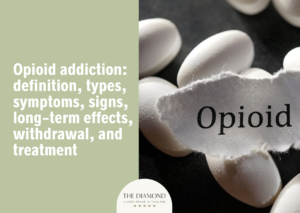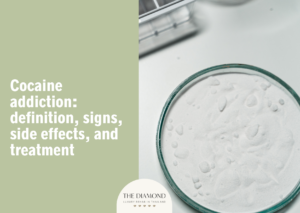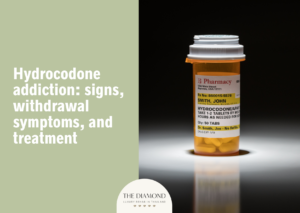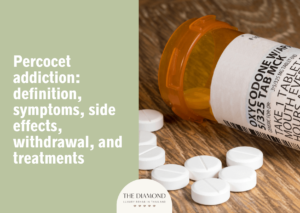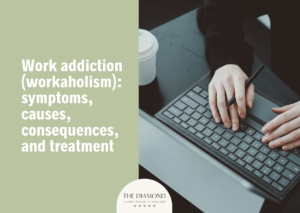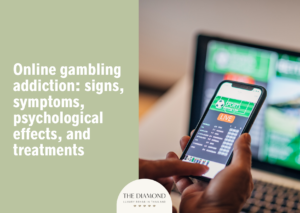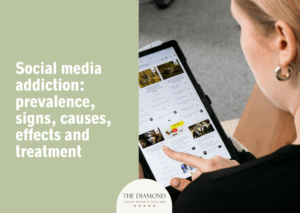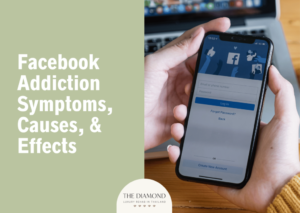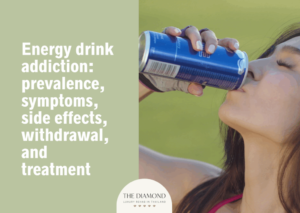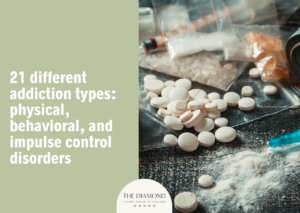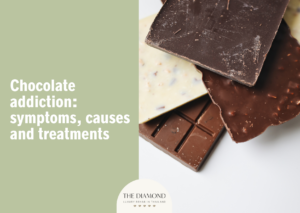Work addiction (workaholism): symptoms, causes, consequences, and treatment
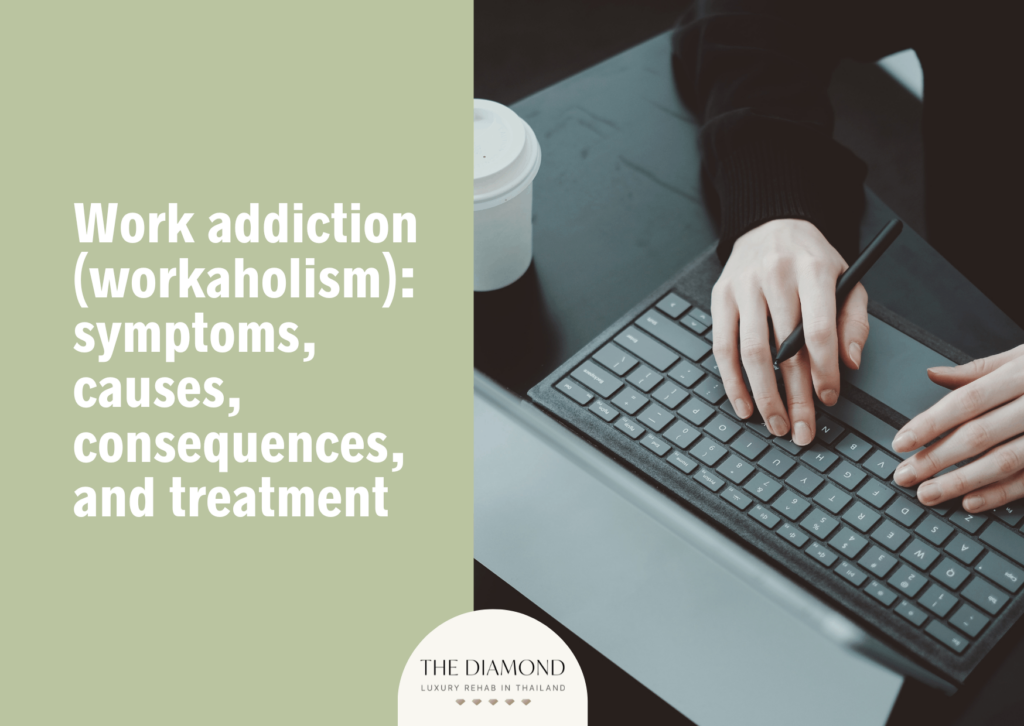
Work addiction is an obsessive compulsion to work excessively and relentlessly, often at the expense of personal relationships and well-being. People who emphasize work over relaxation and recreation experience physical, mental and emotional fatigue as a result of the disorder.
The symptoms and signs of work addiction include an inability to disconnect, putting in unnecessary hours, persistent urge to work, forgoing sleep in favor of work, guilt or anxiety when not working, fixation on professional achievement, physical symptoms of stress, paranoia about work performance, coping with depression or guilt through working and working to avoid dealing with crises.
The causes of work addiction are perfectionism, coexisting mental health conditions, cultural expectations, fear of failure, parental work addiction and impulsiveness and compulsiveness.
The consequences of work addiction include chronic fatigue, burnout, stress, strained relationships, mental health issues, impaired judgment and poor health.
Treatment options for work addiction include cognitive behavioral therapy (CBT), motivational interviewing (MI), 12-step programs, rational emotive behavioral therapy (REBT), time management training and lifestyle changes.
What is work addiction (workaholism)?
Work addiction, or workaholism, refers to a condition where individuals feel an uncontrollable urge to work excessively, often beyond what is required or healthy. Personal relationships, self-care and a multitude of life responsibilities are neglected as a consequence of an excessive preoccupation with work tasks.
Unlike those who work long hours out of necessity or ambition, workaholics are driven by a deep, compulsive need to stay busy, sometimes as a way to avoid emotional distress or gain approval.
The compulsive behavior creates a constant state of tension, as the person feels pressured to perform even when rest is necessary. Productivity becomes intertwined with self-worth, leading to guilt or anxiety whenever work is not being done. Individuals become overly concerned with meeting expectations or maintaining a flawless image in professional settings.
What is a workaholic?

A workaholic is an individual who works excessively to the point where professional duties dominate nearly every aspect of life. Such a person struggles to detach from workplace responsibilities even during personal time.
The urge to remain occupied often stems from an inner need to gain satisfaction through achievement. Even short breaks trigger unease, preventing the mind from fully switching off from tasks or deadlines.
Rather than seeing work as one element of a balanced life, the workaholic regards professional duties as the sole source of identity and purpose. Continuous involvement frequently results in physical exhaustion and emotional pressure. Attempts to rest feel unproductive, reinforcing the cycle of overworking.
When does work become an addiction?
Work becomes an addiction when professional commitment outweighs every other aspect of life. The pursuit of success turns excessive, replacing relaxation and leisure with nonstop activity.
Environmental factors of addiction, such as workplace pressure, competitive culture or unrealistic expectations typically intensify one’s compulsion to perform. When work takes precedence over personal connections and health, a person’s sense of balance between the two starts to slip. Work starts to serve as a primary source of identity and status within society.
The satisfaction once derived from achievement fades as exhaustion and anxiety take hold. Even during free time, thoughts remain focused on tasks or unfinished projects. Emotional fulfillment becomes tied entirely to accomplishments, leaving little room for genuine rest. The drive for recognition masks deeper insecurities, fueling further overinvolvement.
How common is work addiction?
Work addiction is common, with a pooled prevalence of 15.2% reported across 53 studies in a 2023 report by Andersen et al., titled “The prevalence of workaholism: a systematic review and meta-analysis.” Findings indicate roughly one in seven individuals experience the condition, underscoring workaholism as a widespread behavioral concern.
The study further stated most research on workaholism concentrates on causes and effects, leaving limited data on how many people are affected, a challenge shared with other workplace issues.
The lack of data hinders recognition from governments and organizations, slowing the creation of effective prevention and intervention measures. To address the problem, the researchers aimed to combine available estimates to form a single, clearer picture of workaholism’s scope and impact.
However, the task remains complex due to the absence of a universal definition, inconsistent assessment methods and the reliance on studies not representing the broader population.
What are the symptoms and signs of work addiction?
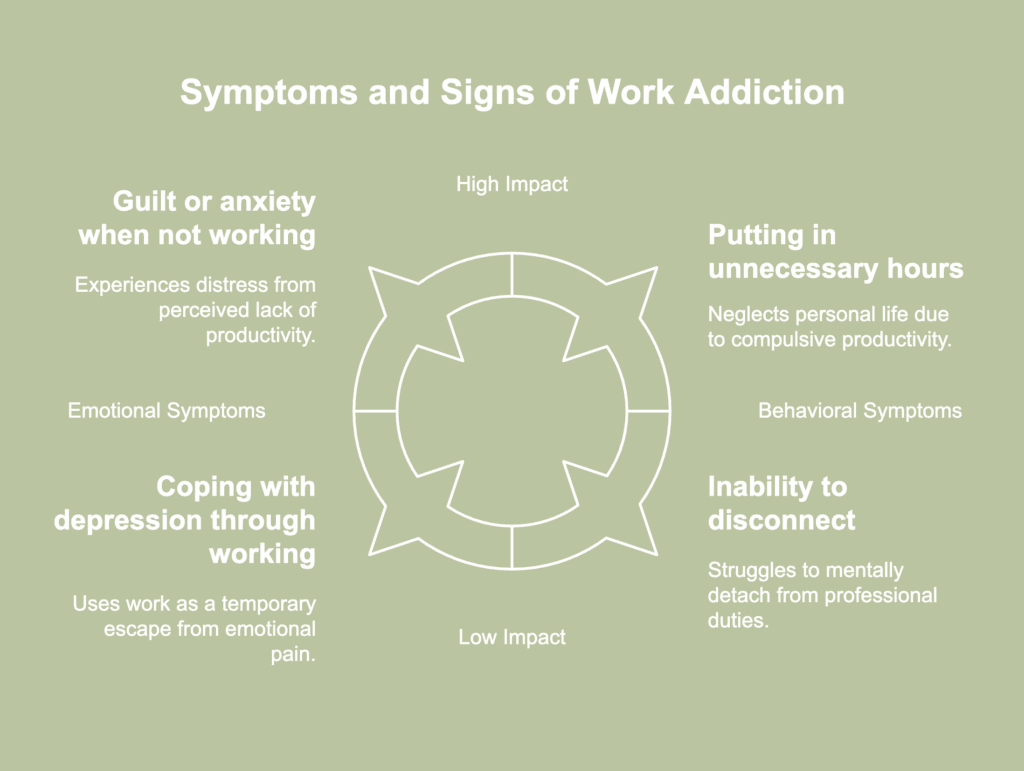
Symptoms and signs of work addiction refer to the observable behaviors and physical or emotional indicators suggesting a person is compulsively overworking. The symptoms and signs of work addiction are listed below.
- Inability to disconnect: A person with work addiction (WA) struggles to mentally step away from professional duties, even outside of working hours. Thoughts about deadlines, goals or ongoing projects linger, making relaxation feel nearly impossible. Attempts to rest lead to unease or frustration, as the mind constantly drifts back to tasks. The inability to detach prevents recovery from stress, leaving the person in a constant state of tension.
- Putting in unnecessary hours: Affected individuals extend their workday far beyond what tasks require. The extra hours are not driven by necessity but by a compulsion to stay productive or prove worth. As a result, personal activities and social interactions are neglected. Such behavior eventually leads to exhaustion without any real improvement in performance or satisfaction.
- Persistent urge to work: A strong internal pressure to keep working dominates daily life. Even without urgent deadlines, the individual feels compelled to stay busy or take on more tasks. The need to remain occupied becomes a source of comfort, masking deeper emotional unease. Continuous engagement in work creates an endless cycle of effort and restlessness.
- Forgoing sleep in favor of work: Sleep becomes a secondary concern to professional duties. Late nights spent finishing tasks or planning for the next day replace necessary rest. According to a 2024 study by Charkhabi et al., titled “Work addiction risk, stress and well-being at work: testing the mediating role of sleep quality,” sleep quality mediates the link between work addiction risk, stress and well-being. Poor sleep intensified the negative effects of excessive work involvement on stress and overall health.
- Guilt or anxiety when not working: Moments of rest trigger feelings of guilt or nervousness, as being unproductive feels wrong. The mind interprets downtime as wasted potential rather than much needed recovery. A 2024 study by Gil-LaOrden et al., involving 714 Brazilian teachers, titled “The Role of Guilt Feelings in the Development of the Burnout Process: The Influence on Psychosomatic Problems” revealed guilt as a key factor in burnout development. The findings showed feelings of guilt influence how burnout progresses and relate to psychosomatic issues such as headaches and sleep disturbances, both strongly linked to emotional strain.
- Fixation on professional achievement: Workaholics tend to define personal value through titles, accomplishments and recognition. Each success offers brief satisfaction before another goal emerges. Seeking validation replaces genuine satisfaction with pressure to achieve more. Identity narrows until career triumphs define one’s entire sense of self.
- Physical symptoms of stress: Chronic stress from excessive work eventually manifests through physical discomfort. Headaches, muscle tension or digestive problems become frequent companions. The body’s warning signs usually go ignored in the pursuit of productivity. Neglecting physical well-being deepens fatigue and heightens vulnerability to illness.
- Paranoia about work performance: An obsessive fear of underperforming develops, even when success is evident. Minor mistakes or feedback trigger disproportionate worry and self-criticism. The individual begins to question competence and seeks reassurance from others. In a 2020 study by Mazzetti et al., called “Same Involvement, Different Reasons: How Personality Factors and Organizations Contribute to Heavy Work Investment,” fear of failure showed a strong positive correlation with workaholism, indicating how anxiety about failing increases the likelihood of compulsive overwork. In contrast, the same fear correlated negatively with engagement, revealing how avoidance undermines the energy and dedication seen in genuinely motivated workers.
- Coping with depression or guilt through working: Work sometimes becomes an escape from negative emotions or unresolved pain. Immersing oneself in tasks offers temporary relief from sadness, guilt or loneliness. However, the comfort is short-lived, as emotional struggles remain unaddressed. The dependence on productivity as a coping mechanism intensifies emotional distress over time.
- Working to avoid dealing with crises: Engaging in nonstop work serves as a distraction from personal or emotional crises. The focus on professional matters provides an illusion of control amid turmoil. Through staying busy, uncomfortable realities such as conflict or grief are avoided. Such an avoidance prevents healing and deepens internal turmoil masked behind busyness.
What are the causes of work addiction?
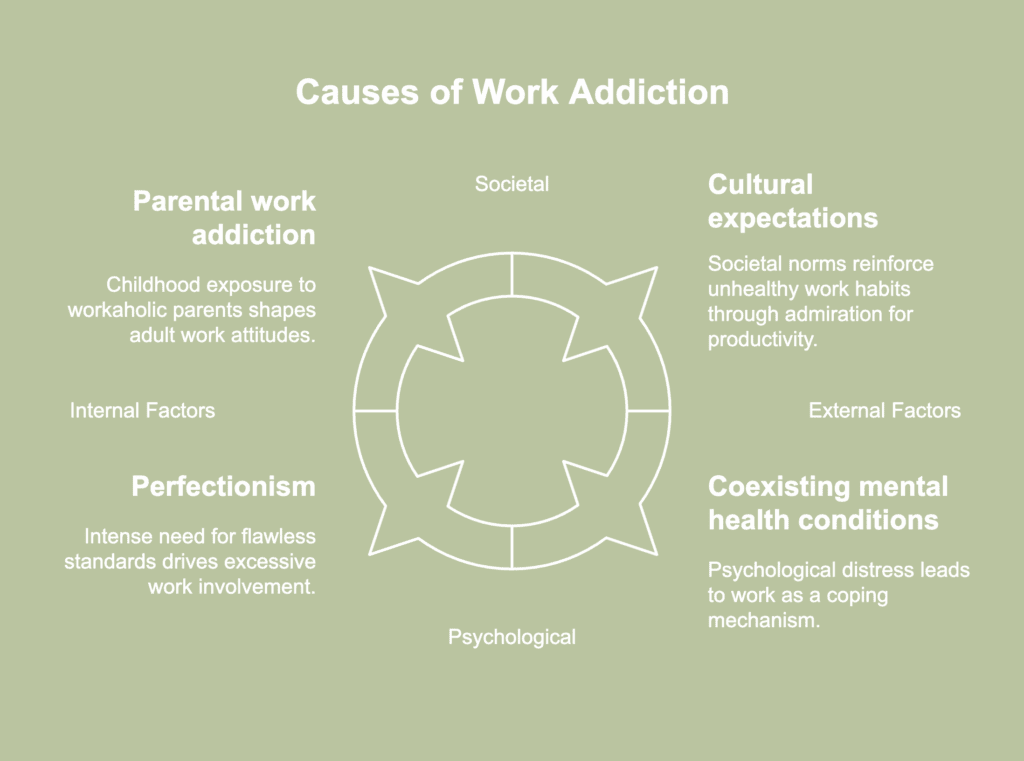
Causes of work addiction refer to the underlying factors contributing to an individual’s compulsive need to work excessively. The causes of work addiction are listed below.
- Perfectionism: An intense need to meet flawless standards fuels excessive work involvement. Minor mistakes create disproportionate frustration, pushing for correction and refinement. A 2023 paper by Modesta Morkevičiūtė and Auksė Endriulaitienė, titled “The Role of an Individual and a Situation in Explaining Work Addiction: Disclosing Complex Relations” identified a strong link between perfectionism and work addiction. Individuals with high perfectionistic tendencies face an increased risk of developing compulsive work habits, especially in high-pressure organizational environments.
- Coexisting mental health conditions: Anxiety, depression or obsessive tendencies heighten vulnerability to WA. Immersing in professional tasks provides a temporary escape from emotional discomfort. Productivity becomes a coping tool, concealing distress beneath heavy workload. Emotional dependence on work eventually deepens, leaving unresolved psychological issues unattended.
- Cultural expectations: Societal admiration for productivity and achievement reinforces unhealthy work habits. In various environments, long hours are viewed as proof of discipline and ambition. External approval becomes a silent motivator, encouraging individuals to push beyond healthy limits. Participants in a 2023 study by Negura et al., titled “The social construction of workaholism as a representational naturalization” learned about workaholism through media and social networks, revealing how Western culture normalizes excessive work through films and reports. Communication reinforces the idea performatively, as phrases like “you’re a workaholic” carry expectations of both distress and success tied to overwork. The experience gains cultural validation when exhaustion and strained relationships mirror familiar narratives of achievement through sacrifice.
- Fear of failure: A deep fear of falling short drives relentless effort. Every task becomes a test of worth, turning productivity into a form of self-protection. Achievements bring momentary comfort before doubt creeps in again, urging even greater effort to avoid perceived shortcomings. The pressure to prove competence never eases, creating a continual tension between ambition and insecurity.
- Parental work addiction: Growing up in an environment where parents always prioritized work shapes later attitudes toward success. Children absorb such behaviors, learning to associate approval with continuous effort and sacrifice. As adults, they repeat the same patterns, believing rest signals weakness or failure. A 2022 article by Modesta Morkevičiūtė and Auksė Endriulaitienė, called “Understanding Work Addiction in Adult Children: The Effect of Addicted Parents and Work Motivation” found a link between a father’s perceived work addiction and greater work addiction in adult children, driven mainly by external motives such as rewards or avoidance of guilt instead of genuine interest, supporting the view that addiction arises from outside pressures rather than enjoyment.
- Impulsiveness and compulsiveness: Certain personality traits, such as impulsive decision-making and compulsive persistence, heighten vulnerability to excessive working. Quick reactions to pressure lead to taking on more tasks than manageable, while the inability to pause keeps the cycle going. In a 2023 article by Berta et al., titled “The neuropsychological profile of work addiction,” participants in the high-risk work addiction (HWA) showed stronger impulsive and compulsive tendencies than those in the low-risk group (LWA). The results suggest individuals with work addiction are more prone to such behaviours closely tied to addictive work patterns.
What are the consequences of work addiction?

Consequences of work addiction refer to the wide-ranging negative outcomes stemming from excessive and uncontrollable involvement in professional activities. The consequences of work addiction are listed below.
- Chronic fatigue: Persistent exhaustion develops as the body and mind struggle to recover from continuous labor. Energy levels remain low even after rest, leading to irritability and poor concentration. Each day feels heavier, as motivation declines and simple tasks demand more effort. The tiredness eventually undermines both performance and overall vitality.
- Burnout: Sustained immersion in work drains emotional and physical energy, leaving individuals unable to perform at their usual capacity. Over time, prolonged stress develops into burnout syndrome, a state marked by exhaustion, detachment and a sense of ineffectiveness. As the condition progresses, recovery becomes increasingly difficult without proper intervention and rest. As per a 2023 study by Bereznowski et al., titled “Work addiction, work engagement, job burnout, and perceived stress: A network analysis,” mechanisms linking work engagement to addiction and addiction to burnout revolve around deep absorption in tasks and mood-altering efforts to ease chronic stress and negative emotions. Consequently, problems arising from work addiction result in severe exhaustion.
- Stress: One of the most immediate and pervasive consequences of work addiction is constant, high levels of stress. Unrelenting pressure to meet expectations triggers chronic stress affecting both mind and body. Muscle tension, headaches and rapid heart rate often accompany the psychological strain. A 2024 study by Charkhabi et al., titled “Work addiction risk, stress and well-being at work: testing the mediating role of sleep quality” reported a positive link between work or home stress and the likelihood of developing work addiction. Employees facing greater stress in both settings showed a higher risk of becoming work addicted.
- Strained relationships: Workaholics tend to miss important events, fail to engage emotionally or prioritize work over spending time with loved ones. Excessive devotion to work causes personal connections to fade. Friends and family feel neglected, as conversations and shared time revolve around professional matters. Emotional distance grows, leading to misunderstandings and resentment.
- Mental health issues: Work addiction is closely linked to mental health problems such as anxiety and depression. The pressure to perform, combined with the lack of downtime, heightens feelings of stress and emotional strain. The inability to disconnect keeps the mind trapped in cycles of worry and self-criticism. Among male workers in Hong Kong, workaholism has been linked to symptoms of depression. The connection between excessive work involvement and depression was partly explained through work-life balance stress and persistent fatigue, as noted in a 2020 study by Yang et al., titled “The mediation role of work-life balance stress and chronic fatigue in the relationship between workaholism and depression among Chinese male workers in Hong Kong.”
- Impaired judgment: Excessive focus on professional tasks clouds decision-making and reduces clarity of thought. Fatigue and stress impair rational evaluation, increasing the likelihood of mistakes. Impulsive reactions replace careful planning as mental strain accumulates. Poor choices gradually damage both reputation and performance, reinforcing feelings of inadequacy.
- Poor health: Neglecting rest, nutrition and exercise harms the body’s resilience. Cardiovascular issues, weakened immunity and digestive problems develop under prolonged strain. Physical discomfort becomes a daily burden, reducing capacity to handle even basic routines. Continued disregard for well-being transforms ambition into a serious health risk.
What are the impacts of work addiction on family life?
The impacts of work addiction on family life include emotional detachment, deteriorating bonds and relational strain. Intense focus on professional responsibilities leads to neglect of household duties and family interactions, leaving loved ones feeling unappreciated or ignored. With time, the lack of presence and support damages trust and intimacy within the home.
Spouses and children feel emotionally detached, as communication and shared experiences become increasingly rare. Unbalanced professional and personal responsibilities lead to a recurring work-life conflict, shattering familial bonds and understanding. Family customs and daily routines are damaged, causing sentiments of desertion or resentment.
Arguments about time, priorities and responsibilities frequently escalate into ongoing disagreement. Emotional distance widens as the addicted individual seeks satisfaction solely through work rather than connection.
What are the impacts of work addiction on mental health?
The impacts of work addiction on mental health include a steady decline in emotional stability and overall well-being. Persistent overworking heightens stress, pushing the mind into a constant state of tension and fatigue. Continuous pressure to perform fosters anxiety, as individuals struggle to meet unrealistic expectations or fear failure.
The lack of rest and personal fulfilment triggers depression, marked by hopelessness and loss of motivation. Cognitive clarity weakens, leading to slower thinking, poor focus and impaired decision-making. Over time, excessive mental strain contributes to lower mental health, reducing the ability to cope with challenges or maintain emotional balance.
Work becomes both a coping mechanism and a source of distress, deepening psychological exhaustion. Sleep disturbances and irritability become common as the mind fails to disconnect from professional concerns. Social withdrawal worsens mental illness, isolating the person from supportive relationships.
A 2022 study by Fekih-Romdhane et al., titled “Work Addiction and Depression, Anxiety, and Stress: the Mediating Role of Food Addiction Among Lebanese Young Adult Workers” found a strong correlation between work addiction and higher levels of stress, anxiety and depression. Mental health outcomes were notably poorer among workers addicted to work, with work addiction emerging as a clear predictor of psychological distress.
What are the work addiction treatment options?

Work addiction treatment options describe structured interventions designed to help individuals regain balance between professional responsibilities and personal well-being. The most widely used work addiction treatment options are listed below.
- Cognitive behavioral therapy (CBT): Cognitive behavioral therapy assists individuals in identifying harmful work-related thought patterns to be replaced with more balanced perspectives. The approach targets perfectionistic beliefs and unrealistic performance standards. A May 2025 study by Bernadette Kun and Gyöngyi Kökönyei, called “Long-term chronicity of work addiction: the role of personality and work motivations” identified CBT as a proven intervention for work addiction, addressing maladaptive perfectionism and rumination through cognitive restructuring.
- Motivational interviewing (MI): Motivational Interviewing encourages self-reflection on the reasons behind excessive work involvement and the personal costs linked to it. The therapist uses empathetic dialogue to strengthen an individual’s commitment to change and promote intrinsic motivation. Through collaboration, patients gain greater awareness of the conflict between overworking and personal satisfaction. Gradually, motivation shifts from external validation to a more balanced pursuit of achievement and fulfillment.
- 12-step programs: 12-step programs provide a supportive, community-based structure for individuals attempting to overcome compulsive work behaviors. Through frequent group sessions centered on personal development and rehabilitation, participants exchange stories and learn accountability. Acceptance, self-awareness and humility are emphasized in the process of regulating the tendency to overwork.
- Rational emotive behavioral therapy (REBT): REBT focuses on challenging irrational beliefs that drive excessive dedication to work. Therapists help patients replace self-defeating thoughts with rational, evidence-based reasoning to reduce harmful emotional reactions. As per a 2021 study by Cossin et al., titled “Workaholism Prevention in Occupational Medicine: A Systematic Review,” C. Van Wijhe et al. proposed REBT as a suitable approach for addressing workaholism by identifying irrational beliefs driving negative emotional states and promoting healthier thought patterns. In a later study, the same authors demonstrated REBT’s ability to modify rigid cognition and influence performance-based self-esteem, as well as the strict continuation rules rooted in unrealistic expectations and low frustration tolerance.
- Time management training: Time management training teaches practical methods for organizing daily tasks without falling into patterns of overcommitment. Participants learn to prioritize responsibilities, delegate appropriately and create schedules supporting personal balance. The training encourages mindfulness about boundaries and energy levels, reducing the tendency to overextend. With consistent application, efficiency improves while overall stress declines.
- Lifestyle changes: Incorporating lifestyle adjustments into addiction treatment fosters lasting recovery from workaholism. Establishing boundaries between work and personal life helps restore balance and reduce compulsive work habits. Regular exercise, quality sleep, healthy diet and mindfulness promote mental clarity while easing emotional strain. Consistent self-care reinforces healthier priorities and supports long-term emotional stability.
How to break work addiction?
To break work addiction, begin by acknowledging the unhealthy patterns driving excessive work habits. Establish clear boundaries between professional and personal time to prevent regular engagement with job-related tasks.
In addition, compulsive working tendencies are lessened and stress triggers are better recognized when mindfulness is practiced. Schedule regular breaks or a digital detox to disconnect from emails, notifications and work platforms.
Seeking professional guidance, such as therapy, assists in addressing underlying perfectionism or anxiety tied to overworking. Learning to delegate tasks builds trust and eases the pressure to handle everything independently.
Realistic goal-setting promotes sustained production and keeps fatigue at bay. With consistent effort and structured boundaries, recovery from excessive work-driven addictions becomes achievable.
Is there a work addiction test?
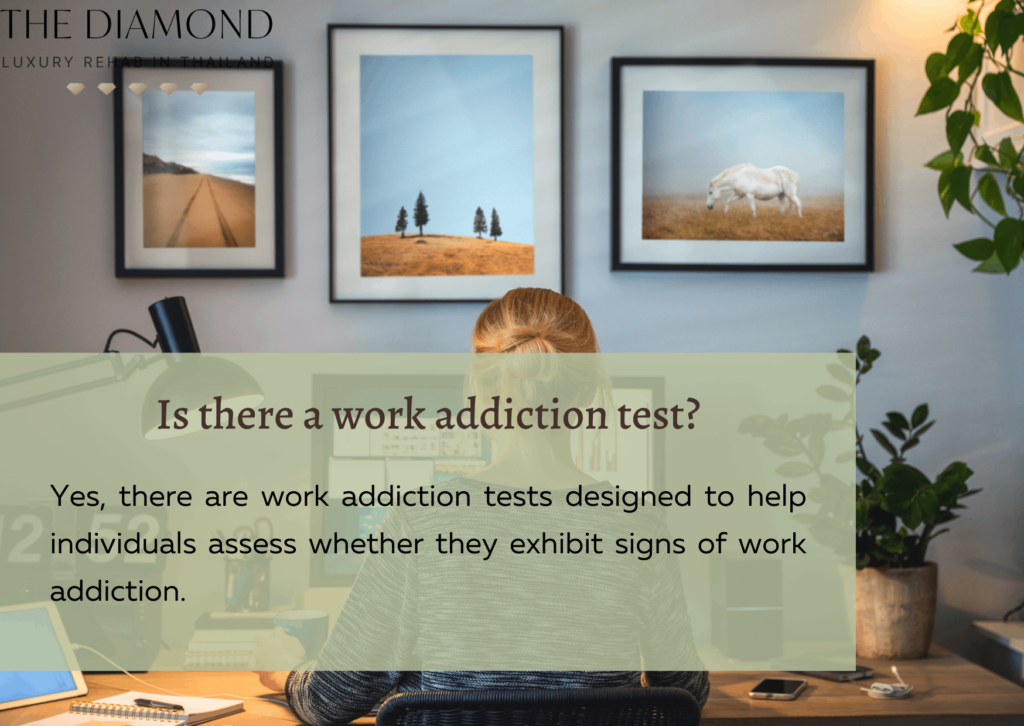
Yes, there are work addiction tests like the Work Addiction Risk Test (WART), Workaholism Battery (WorkBAT), Dutch Work Addiction Scale (DUWAS), and Bergen Work Addiction Scale (BWAS), as outlined in a 2023 study by Andersen et al., titled “The prevalence of workaholism: a systematic review and meta-analysis.”
Since the 1980s, researchers and clinicians have created such assessments to evaluate compulsive work tendencies and the resulting psychological effects. The review further explained that WART and WorkBAT evaluate behavioral and psychological traits linked to excessive work involvement but have faced criticism for weak factor structures and limited practical use.
DUWAS effectively identifies cognitive and behavioral patterns tied to workaholism yet lacks a solid theoretical basis grounded in addiction frameworks. BWAS, developed from addiction theory, offers a stronger clinical foundation and serves as a more reliable diagnostic instrument.
How is work addiction diagnosed?
Work addiction is diagnosed primarily through self-report questionnaires and behavioral assessments focusing on specific characteristics such as compulsive work behavior, an uncontrollable drive to work and the prioritization of work over personal and social activities.
The process of diagnosing frequently involves spotting psychological patterns and behaviors consistent with addiction models, such as obsessive behaviors, poor control, withdrawal symptoms and adverse consequences.
The Bergen Work Addiction Scale (BWAS) is a well-validated tool grounded in addiction theory. The BWAS evaluates seven key components of addiction such as mood modification, salience, tolerance, withdrawal, relapse, conflict and related problems.


